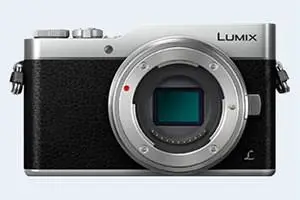Panasonic GX800 vs Sony RX100 VI
The Panasonic Lumix DMC-GX800 (called Panasonic GX850 in some regions) and the Sony Cyber-shot DSC-RX100 VI are two digital cameras that were revealed to the public, respectively, in January 2017 and June 2018. The GX800 is a mirrorless interchangeable lens camera, while the RX100 VI is a fixed lens compact. The cameras are based on a Four Thirds (GX800) and an one-inch (RX100 VI) sensor. The Panasonic has a resolution of 15.8 megapixels, whereas the Sony provides 20 MP.
Below is an overview of the main specs of the two cameras as a starting point for the comparison.

Check GX800 offers at
ebay.com

Check RX100 VI offers at
ebay.com
Going beyond this snapshot of core features and characteristics, what are the differences between the Panasonic Lumix DMC-GX800 and the Sony Cyber-shot DSC-RX100 VI? Which one should you buy? Read on to find out how these two cameras compare with respect to their body size, their imaging sensors, their shooting features, their input-output connections, and their reception by expert reviewers.
Body comparison
The side-by-side display below illustrates the physical size and weight of the Panasonic GX800 and the Sony RX100 VI. The two cameras are presented according to their relative size. Three consecutive views from the front, the top, and the rear side are shown. All width, height and depth measures are rounded to the nearest millimeter.
The GX800 can be obtained in three different colors (black, silver, red), while the RX100 VI is only available in black.
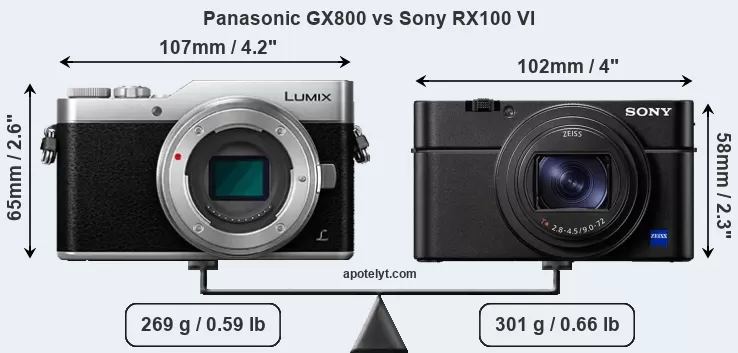
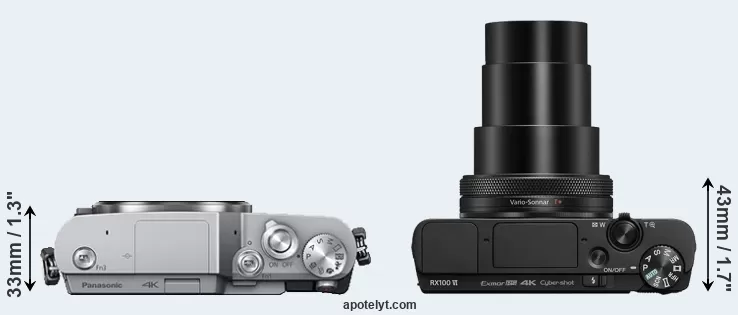
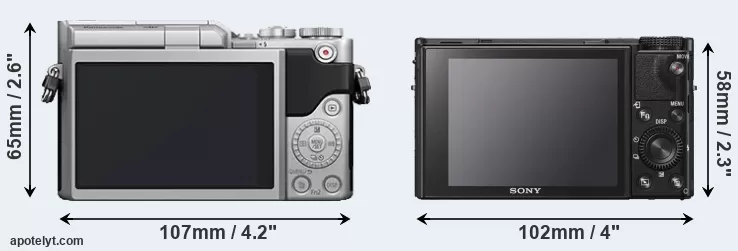
If the front view area (width x height) of the cameras is taken as an aggregate measure of their size, the Sony RX100 VI is notably smaller (15 percent) than the Panasonic GX800. In this context, it is worth noting that neither the GX800 nor the RX100 VI are weather-sealed.
The above size and weight comparisons are to some extent incomplete and possibly misleading, as the RX100 VI has a lens built in, whereas the GX800 is an interchangeable lens camera that requires a separate lens. Attaching the latter will add extra weight and bulk to the setup. You can compare the optics available for the GX800 and their specifications in the Micro Four Thirds Lens Catalog.
Concerning battery life, the GX800 gets 210 shots out of its Panasonic DMW-BLH7 battery, while the RX100 VI can take 240 images on a single charge of its Sony NP-BX1 power pack. The power pack in the RX100 VI can be charged via the USB port, which can be very convenient when travelling.
The following table provides a synthesis of the main physical specifications of the two cameras and other similar ones. If you want to switch the focus of the display and review another camera pair, you can move across to the CAM-parator tool and choose from the broad selection of possible camera comparisons there.

| # | Camera Model |
Camera Width |
Camera Height |
Camera Depth |
Camera Weight |
Battery Life |
Weather Sealing |
Camera Launch |
Launch Price (USD) |
Street Price |
|
|---|---|---|---|---|---|---|---|---|---|---|---|
| 1. | Panasonic GX800 | 107 mm | 65 mm | 33 mm | 269 g | 210 | n | Jan 2017 | 549 | ebay.com | |
| 2. | Sony RX100 VI | 102 mm | 58 mm | 43 mm | 301 g | 240 | n | Jun 2018 | 1,199 | ebay.com | |
| 3. | Canon M100 | 108 mm | 67 mm | 35 mm | 302 g | 295 | n | Aug 2017 | 499 | ebay.com | |
| 4. | Canon M10 | 108 mm | 67 mm | 35 mm | 301 g | 255 | n | Oct 2015 | 499 | ebay.com | |
| 5. | Panasonic G7 | 125 mm | 86 mm | 77 mm | 410 g | 350 | n | May 2015 | 649 | ebay.com | |
| 6. | Panasonic GF7 | 107 mm | 65 mm | 33 mm | 266 g | 230 | n | Jan 2015 | 499 | ebay.com | |
| 7. | Panasonic GM5 | 99 mm | 60 mm | 36 mm | 211 g | 220 | n | Sep 2014 | 749 | ebay.com | |
| 8. | Panasonic G6 | 122 mm | 85 mm | 71 mm | 390 g | 340 | n | Apr 2013 | 599 | ebay.com | |
| 9. | Panasonic GF6 | 111 mm | 65 mm | 38 mm | 323 g | 340 | n | Apr 2013 | 499 | ebay.com | |
| 10. | Panasonic GM1 | 99 mm | 55 mm | 30 mm | 204 g | 230 | n | Oct 2013 | 749 | ebay.com | |
| 11. | Panasonic G5 | 120 mm | 83 mm | 71 mm | 396 g | 320 | n | Jul 2012 | 599 | ebay.com | |
| 12. | Panasonic GF5 | 108 mm | 67 mm | 37 mm | 267 g | 360 | n | Apr 2012 | 499 | ebay.com | |
| 13. | Sony RX100 VII | 102 mm | 58 mm | 43 mm | 302 g | 260 | n | Jul 2019 | 1,199 | amazon.com | |
| 14. | Sony RX100 V | 102 mm | 58 mm | 41 mm | 299 g | 220 | n | Oct 2016 | 999 | ebay.com | |
| 15. | Sony RX100 IV | 102 mm | 58 mm | 41 mm | 298 g | 280 | n | Jun 2015 | 999 | ebay.com | |
| 16. | Sony RX100 III | 102 mm | 58 mm | 41 mm | 290 g | 320 | n | May 2014 | 799 | ebay.com | |
| 17. | Sony RX100 II | 102 mm | 58 mm | 38 mm | 281 g | 350 | n | Jun 2013 | 749 | ebay.com | |
| Note: Measurements and pricing do not include easily detachable parts, such as add-on or interchangeable lenses or optional viewfinders. | |||||||||||
Any camera decision will obviously take relative prices into account. The listed launch prices provide an indication of the market segment that the manufacturer of the cameras have been targeting. Usually, retail prices stay at first close to the launch price, but after several months, discounts become available. Later in the product cycle and, in particular, when the replacement model is about to appear, further discounting and stock clearance sales often push the camera price considerably down.
Sensor comparison
The size of the imaging sensor is a crucial determinant of image quality. All other things equal, a large sensor will have larger individual pixel-units that offer better low-light sensitivity, wider dynamic range, and richer color-depth than smaller pixels in a sensor of the same technological generation. Further, a large sensor camera will give the photographer additional creative options when using shallow depth-of-field to isolate a subject from its background. On the downside, larger sensors are more costly to manufacture and tend to lead to bigger and heavier cameras and lenses.
Of the two cameras under consideration, the Panasonic GX800 features a Four Thirds sensor and the Sony RX100 VI an one-inch sensor. The sensor area in the RX100 VI is 48 percent smaller. As a result of these sensor size differences, the cameras have a format factor of, respectively, 2.0 and 2.7. The sensor in the GX800 has a native 4:3 aspect ratio, while the one in the RX100 VI offers a 3:2 aspect.
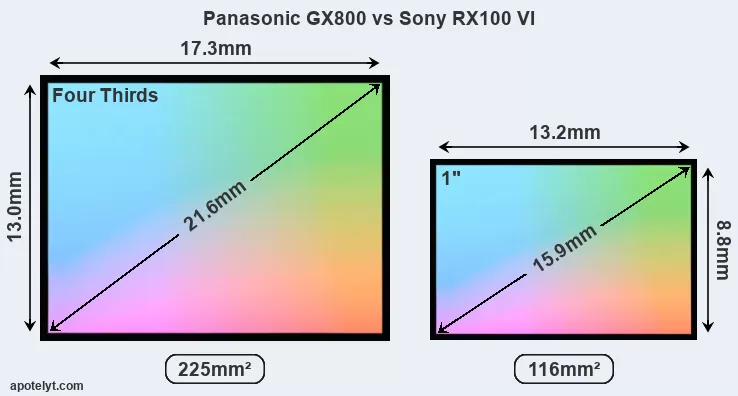
Despite having a smaller sensor, the RX100 VI offers a higher resolution of 20 megapixels, compared with 15.8 MP of the GX800. This megapixels advantage comes at the cost of a higher pixel density and a smaller size of the individual pixel (with a pixel pitch of 2.41μm versus 3.77μm for the GX800). However, it should be noted that the RX100 VI is a somewhat more recent model (by 1 year and 4 months) than the GX800, and its sensor might have benefitted from technological advances during this time that partly offset its pixel-size disadvantage. Coming back to sensor resolution, it should be mentioned that the GX800 has no anti-alias filter installed, so that it can capture all the detail its sensor resolves.
The resolution advantage of the Sony RX100 VI implies greater flexibility for cropping images or the possibility to print larger pictures. The maximum print size of the RX100 VI for good quality output (200 dots per inch) amounts to 27.4 x 18.2 inches or 69.5 x 46.3 cm, for very good quality (250 dpi) 21.9 x 14.6 inches or 55.6 x 37.1 cm, and for excellent quality (300 dpi) 18.2 x 12.2 inches or 46.3 x 30.9 cm. The corresponding values for the Panasonic GX800 are 23 x 17.2 inches or 58.3 x 43.8 cm for good quality, 18.4 x 13.8 inches or 46.7 x 35 cm for very good quality, and 15.3 x 11.5 inches or 38.9 x 29.2 cm for excellent quality prints.
The RX100 VI has on-sensor phase detect pixels, which results in fast and reliable autofocus acquisition even during live view operation.
The Panasonic Lumix DMC-GX800 has a native sensitivity range from ISO 200 to ISO 25600, which can be extended to ISO 100-25600. The corresponding ISO settings for the Sony Cyber-shot DSC-RX100 VI are ISO 125 to ISO 12800, with the possibility to increase the ISO range to 80-25600.
In terms of underlying technology, the GX800 is build around a CMOS sensor, while the RX100 VI uses a BSI-CMOS imager. Both cameras use a Bayer filter for capturing RGB colors on a square grid of photosensors. This arrangement is found in most digital cameras.
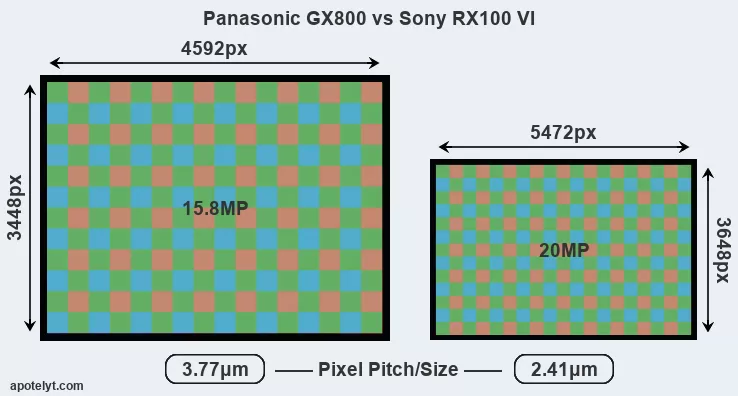
For many cameras, data on sensor performance has been reported by DXO Mark. This service determines an overall sensor rating, as well as sub-scores for low-light sensitivity ("DXO Sports"), dynamic range ("DXO Landscape"), and color depth ("DXO Portrait"). The adjacent table reports on the physical sensor characteristics and the outcomes of the DXO sensor quality tests for a sample of comparator-cameras.

| # | Camera Model |
Sensor Class |
Resolution (MP) |
Horiz. Pixels |
Vert. Pixels |
Video Format |
DXO Portrait |
DXO Landscape |
DXO Sports |
DXO Overall |
|
|---|---|---|---|---|---|---|---|---|---|---|---|
| 1. | Panasonic GX800 | Four Thirds | 15.8 | 4592 | 3448 | 4K/30p | 23.2 | 13.3 | 586 | 73 | |
| 2. | Sony RX100 VI | 1-inch | 20.0 | 5472 | 3648 | 4K/30p | 22.1 | 12.3 | 478 | 64 | |
| 3. | Canon M100 | APS-C | 24.0 | 6000 | 4000 | 1080/60p | 23.5 | 12.9 | 1272 | 78 | |
| 4. | Canon M10 | APS-C | 17.9 | 5184 | 3456 | 1080/30p | 22.2 | 11.4 | 753 | 65 | |
| 5. | Panasonic G7 | Four Thirds | 15.8 | 4592 | 3448 | 4K/30p | 22.8 | 12.4 | 904 | 71 | |
| 6. | Panasonic GF7 | Four Thirds | 15.8 | 4592 | 3448 | 1080/60p | 22.7 | 12.3 | 874 | 70 | |
| 7. | Panasonic GM5 | Four Thirds | 15.8 | 4592 | 3448 | 1080/60p | 22.1 | 11.7 | 721 | 66 | |
| 8. | Panasonic G6 | Four Thirds | 15.9 | 4608 | 3456 | 1080/60p | 21.3 | 11.5 | 639 | 61 | |
| 9. | Panasonic GF6 | Four Thirds | 15.8 | 4592 | 3448 | 1080/60i | 20.7 | 10.6 | 622 | 54 | |
| 10. | Panasonic GM1 | Four Thirds | 15.8 | 4592 | 3448 | 1080/60i | 22.3 | 11.7 | 660 | 66 | |
| 11. | Panasonic G5 | Four Thirds | 15.9 | 4608 | 3456 | 1080/60p | 21.4 | 11.6 | 618 | 61 | |
| 12. | Panasonic GF5 | Four Thirds | 12.0 | 4000 | 3000 | 1080/60i | 20.5 | 10.0 | 573 | 50 | |
| 13. | Sony RX100 VII | 1-inch | 20.0 | 5472 | 3648 | 4K/30p | 21.8 | 12.4 | 418 | 63 | |
| 14. | Sony RX100 V | 1-inch | 20.0 | 5472 | 3648 | 4K/30p | 22.8 | 12.4 | 586 | 70 | |
| 15. | Sony RX100 IV | 1-inch | 20.0 | 5472 | 3648 | 4K/30p | 22.8 | 12.6 | 591 | 70 | |
| 16. | Sony RX100 III | 1-inch | 20.0 | 5472 | 3648 | 1080/60p | 22.4 | 12.3 | 495 | 67 | |
| 17. | Sony RX100 II | 1-inch | 20.0 | 5472 | 3648 | 1080/60p | 22.5 | 12.4 | 483 | 67 | |
| Note: DXO values in italics represent estimates based on sensor size and age. | |||||||||||
Many modern cameras are not only capable of taking still images, but can also record movies. Both cameras under consideration are equipped with sensors that have a sufficiently high read-out speed for moving images, and both provide the same movie specifications (4K/30p).
Feature comparison
Apart from body and sensor, cameras can and do differ across a variety of features. For example, the RX100 VI has an electronic viewfinder (2359k dots), which can be very helpful when shooting in bright sunlight. In contrast, the GX800 relies on live view and the rear LCD for framing. The following table reports on some other key feature differences and similarities of the Panasonic GX800, the Sony RX100 VI, and comparable cameras.

| # | Camera Model |
Viewfinder (Type or 000 dots) |
Control Panel (yes/no) |
LCD Specifications (inch/000 dots) |
LCD Attach- ment |
Touch Screen (yes/no) |
Max Shutter Speed * |
Max Shutter Flaps * |
Built-in Flash (yes/no) |
Built-in Image Stab |
|
|---|---|---|---|---|---|---|---|---|---|---|---|
| 1. | Panasonic GX800 | none | n | 3.0 / 1040 | tilting | Y | 1/500s | 10.0/s | Y | n | |
| 2. | Sony RX100 VI | 2359 | n | 3.0 / 1229 | tilting | Y | 1/2000s | 24.0/s | Y | Y | |
| 3. | Canon M100 | none | n | 3.0 / 1040 | tilting | Y | 1/4000s | 6.1/s | Y | n | |
| 4. | Canon M10 | none | n | 3.0 / 1040 | tilting | Y | 1/4000s | 4.6/s | Y | n | |
| 5. | Panasonic G7 | 2360 | n | 3.0 / 1040 | swivel | Y | 1/4000s | 7.0/s | Y | n | |
| 6. | Panasonic GF7 | none | n | 3.0 / 1040 | tilting | Y | 1/500s | 5.8/s | Y | n | |
| 7. | Panasonic GM5 | 1166 | n | 3.0 / 921 | fixed | Y | 1/500s | 5.8/s | n | n | |
| 8. | Panasonic G6 | 1440 | n | 3.0 / 1036 | swivel | Y | 1/4000s | 7.0/s | Y | n | |
| 9. | Panasonic GF6 | none | n | 3.0 / 1040 | tilting | Y | 1/4000s | 4.2/s | Y | n | |
| 10. | Panasonic GM1 | none | n | 3.0 / 1036 | fixed | Y | 1/500s | 5.0/s | Y | n | |
| 11. | Panasonic G5 | 1440 | n | 3.0 / 920 | swivel | Y | 1/4000s | 6.0/s | Y | n | |
| 12. | Panasonic GF5 | none | n | 3.0 / 920 | fixed | Y | 1/4000s | 4.0/s | Y | n | |
| 13. | Sony RX100 VII | 2359 | n | 3.0 / 921 | tilting | Y | 1/2000s | 90.0/s | Y | Y | |
| 14. | Sony RX100 V | 2359 | n | 3.0 / 1229 | tilting | n | 1/2000s | 24.0/s | Y | Y | |
| 15. | Sony RX100 IV | 2359 | n | 3.0 / 1228 | tilting | n | 1/2000s | 16.0/s | Y | Y | |
| 16. | Sony RX100 III | 1440 | n | 3.0 / 1229 | tilting | n | 1/2000s | 10.0/s | Y | Y | |
| 17. | Sony RX100 II | optional | n | 3.0 / 1229 | tilting | n | 1/2000s | 10.0/s | Y | Y | |
| Note: *) Information refers to the mechanical shutter, unless the camera only has an electronic one. | |||||||||||
The reported shutter speed information refers to the use of the mechanical shutter. Yet, some cameras only have an electronic shutter, while others have an electronic shutter in addition to a mechanical one. In fact, both cameras under consideration feature an electronic shutter, which makes completely silent shooting possible. However, this mode is less suitable for photographing moving objects (risk of rolling shutter) or shooting under artificial light sources (risk of flickering).
The Panasonic GX800 has an intervalometer built-in. This enables the photographer to capture time lapse sequences, such as flower blooming, a sunset or moon rise, without purchasing an external camera trigger and related software.
The GX800 writes its imaging data to SDXC cards, while the RX100 VI uses SDXC or Memory Stick PRO Duo cards. Both cameras can use UHS-I cards, which provide for Ultra High Speed data transfer of up to 104 MB/s.
Connectivity comparison
For some imaging applications, the extent to which a camera can communicate with its environment can be an important aspect in the camera decision process. The table below provides an overview of the connectivity of the Panasonic Lumix DMC-GX800 and Sony Cyber-shot DSC-RX100 VI and, in particular, the interfaces the cameras (and selected comparators) provide for accessory control and data transfer.

| # | Camera Model |
Hotshoe Port |
Internal Mic / Speaker |
Microphone Port |
Headphone Port |
HDMI Port |
USB Port |
WiFi Support |
NFC Support |
Bluetooth Support |
|
|---|---|---|---|---|---|---|---|---|---|---|---|
| 1. | Panasonic GX800 | - | stereo / mono | - | - | micro | 2.0 | Y | - | - | |
| 2. | Sony RX100 VI | - | stereo / mono | - | - | micro | 2.0 | Y | Y | Y | |
| 3. | Canon M100 | - | stereo / mono | - | - | micro | 2.0 | Y | Y | Y | |
| 4. | Canon M10 | - | stereo / mono | - | - | mini | 2.0 | Y | Y | - | |
| 5. | Panasonic G7 | Y | stereo / mono | Y | - | micro | 2.0 | Y | - | - | |
| 6. | Panasonic GF7 | - | stereo / mono | - | - | micro | 2.0 | Y | Y | - | |
| 7. | Panasonic GM5 | Y | stereo / mono | - | - | micro | 2.0 | Y | - | - | |
| 8. | Panasonic G6 | Y | stereo / mono | Y | - | mini | 2.0 | Y | Y | - | |
| 9. | Panasonic GF6 | - | stereo / mono | - | - | mini | 2.0 | Y | Y | - | |
| 10. | Panasonic GM1 | - | stereo / mono | - | - | micro | 2.0 | Y | - | - | |
| 11. | Panasonic G5 | Y | stereo / mono | - | - | mini | 2.0 | - | - | - | |
| 12. | Panasonic GF5 | - | stereo / mono | - | - | mini | 2.0 | - | - | - | |
| 13. | Sony RX100 VII | - | stereo / mono | Y | - | micro | 2.0 | Y | Y | Y | |
| 14. | Sony RX100 V | - | stereo / mono | - | - | micro | 2.0 | Y | Y | - | |
| 15. | Sony RX100 IV | - | stereo / mono | - | - | micro | 2.0 | Y | Y | - | |
| 16. | Sony RX100 III | - | stereo / mono | - | - | micro | 2.0 | Y | Y | - | |
| 17. | Sony RX100 II | Y | stereo / mono | - | - | micro | 2.0 | Y | Y | - |
Both the GX800 and the RX100 VI have been discontinued, but can regularly be found used on ebay. The RX100 VI was replaced by the Sony RX100 VII, while the GX800 does not have a direct successor. Further information on the features and operation of the GX800 and RX100 VI can be found, respectively, in the Panasonic GX800 Manual (free pdf) or the online Sony RX100 VI Manual.
Review summary
So what conclusions can be drawn? Is there a clear favorite between the Panasonic GX800 and the Sony RX100 VI? Which camera is better? A synthesis of the relative strong points of each of the models is listed below.

Arguments in favor of the Panasonic Lumix DMC-GX800:
- Maximized detail: Lacks an anti-alias filter to exploit the sensor's full resolution potential.
- Better image quality: Features bigger pixels on a larger sensor for higher quality imaging.
- Richer colors: The pixel size advantage translates into images with better, more accurate colors.
- More dynamic range: Larger pixels capture a wider spectrum of light and dark details.
- Better low-light sensitivity: Larger pixels means good image quality even under poor lighting.
- Easier time-lapse photography: Has an intervalometer built-in for low frequency shooting.
- More flexible: Accepts interchangeable lenses, so that lens characteristics can be altered.
- More heavily discounted: Has been on the market for longer (launched in January 2017).

Reasons to prefer the Sony Cyber-shot DSC-RX100 VI:
- More detail: Has more megapixels (20 vs 15.8MP), which boosts linear resolution by 15%.
- Better moiré control: Has an anti-alias filter to avoid artificial patterns to appear in images.
- Better live-view autofocus: Features on-sensor phase-detection for more confident autofocus.
- Easier framing: Has an electronic viewfinder for image composition and settings control.
- More detailed LCD: Has a higher resolution rear screen (1229k vs 1040k dots).
- Faster shutter: Has higher mechanical shutter speed (1/2000s vs 1/500s) to freeze action.
- Faster burst: Shoots at higher frequency (24 vs 10 flaps/sec) to capture the decisive moment.
- Ready to shoot: Has an integrated lens, whereas the GX800 necessitates an extra lens.
- More compact: Is smaller (102x58mm vs 107x65mm) and will fit more readily into a bag.
- Longer lasting: Gets more shots (240 versus 210) out of a single battery charge.
- Easier travel charging: Can be conveniently charged via its USB port.
- Sharper images: Has stabilization technology built-in to reduce the impact of hand-shake.
- Easier device pairing: Supports NFC for fast wireless image transfer over short distances.
- Easier wireless transfer: Supports Bluetooth for image sharing without cables.
- More modern: Was introduced somewhat (1 year and 4 months) more recently.
If the number of relative strengths (bullet points above) is taken as a guide, the RX100 VI is the clear winner of the contest (15 : 8 points). However, the pertinence of the various camera strengths will differ across photographers, so that you might want to weigh individual camera traits according to their importance for your own imaging needs before making a camera decision. A professional sports photographer will view the differences between cameras in a way that diverges from the perspective of a street photog, and a person interested in family portraits has distinct needs from a landscape shooter. Hence, the decision which camera is best and worth buying is often a very personal one.
How about other alternatives? Do the specifications of the Panasonic GX800 and the Sony RX100 VI place the cameras among the top in their class? Find out in the latest Best Mirrorless Interchangeable Lens Camera and Best Travel-Zoom Camera listings whether the two cameras rank among the cream of the crop.
In any case, while the comparison of the spec-sheets of cameras can offer a general idea of their imaging potential, it remains partial and cannot reveal, for example, the shooting experience and imaging performance when actually working with the GX800 or the RX100 VI. User reviews, such as those found at amazon, can sometimes inform about these issues, but such feedback is often incomplete, inconsistent, and biased.
Expert reviews
This is where reviews by experts come in. The following table reports the overall ratings of the cameras as published by some of the major camera review sites (amateurphotographer [AP], cameralabs [CL], digitalcameraworld [DCW], dpreview [DPR], ephotozine [EPZ], photographyblog [PB]). As can be seen, the professional reviewers agree in many cases on the quality of different cameras, but sometimes their assessments diverge, reinforcing the earlier point that a camera decision is often a very personal choice.

| # | Camera Model |
AP score |
CL score |
DCW score |
DPR score |
EPZ score |
PB score |
Camera Launch |
Launch Price (USD) |
Street Price |
|
|---|---|---|---|---|---|---|---|---|---|---|---|
| 1. | Panasonic GX800 | .. | + | .. | 76/100 | 4.5/5 | 4.5/5 | Jan 2017 | 549 | ebay.com | |
| 2. | Sony RX100 VI | 4.5/5 | + + | .. | 83/100 | 4/5 | 4.5/5 | Jun 2018 | 1,199 | ebay.com | |
| 3. | Canon M100 | 3/5 | + | .. | .. | 4/5 | 3.5/5 | Aug 2017 | 499 | ebay.com | |
| 4. | Canon M10 | .. | .. | .. | .. | .. | 4/5 | Oct 2015 | 499 | ebay.com | |
| 5. | Panasonic G7 | 4/5 | + + | 3.5/5 | 80/100 | 5/5 | 4.5/5 | May 2015 | 649 | ebay.com | |
| 6. | Panasonic GF7 | 4/5 | + | .. | .. | 4.5/5 | 4.5/5 | Jan 2015 | 499 | ebay.com | |
| 7. | Panasonic GM5 | 3.5/5 | + | .. | 77/100 | 5/5 | 4.5/5 | Sep 2014 | 749 | ebay.com | |
| 8. | Panasonic G6 | 4/5 | + + | .. | .. | 5/5 | 4.5/5 | Apr 2013 | 599 | ebay.com | |
| 9. | Panasonic GF6 | .. | + + | .. | .. | 4.5/5 | 4.5/5 | Apr 2013 | 499 | ebay.com | |
| 10. | Panasonic GM1 | 3/5 | + | .. | 78/100 | 5/5 | 4.5/5 | Oct 2013 | 749 | ebay.com | |
| 11. | Panasonic G5 | 3/5 | + + | .. | .. | 4.5/5 | 4.5/5 | Jul 2012 | 599 | ebay.com | |
| 12. | Panasonic GF5 | 3/5 | .. | .. | .. | 4.5/5 | 4.5/5 | Apr 2012 | 499 | ebay.com | |
| 13. | Sony RX100 VII | 4.5/5 | .. | 4/5 | .. | 4/5 | 5/5 | Jul 2019 | 1,199 | amazon.com | |
| 14. | Sony RX100 V | 4.5/5 | + + | .. | 83/100 | 4/5 | 4.5/5 | Oct 2016 | 999 | ebay.com | |
| 15. | Sony RX100 IV | 4.5/5 | + + | .. | 85/100 | 4/5 | 4.5/5 | Jun 2015 | 999 | ebay.com | |
| 16. | Sony RX100 III | 5/5 | + + | .. | 82/100 | 4.5/5 | 5/5 | May 2014 | 799 | ebay.com | |
| 17. | Sony RX100 II | 5/5 | + + | .. | 79/100 | 4.5/5 | 4.5/5 | Jun 2013 | 749 | ebay.com | |
| Note: (+ +) highly recommended; (+) recommended; (o) reviewed; (..) not available. | |||||||||||
The above review scores should be interpreted with care, though. The ratings are only valid when referring to cameras in the same category and of the same age. Hence, a score should always be seen in the context of the camera's market launch date and its price, and rating-comparisons among cameras that span long time periods or concern very differently equipped models make little sense. Also, please note that some of the review sites have changed their methodology and reporting over time.

Check GX800 offers at
ebay.com

Check RX100 VI offers at
ebay.com
Other camera comparisons
Did this review help to inform your camera decision process? If you would like to see a different side-by-side camera review, just make a corresponding selection in the search boxes below. Alternatively, you can follow any of the listed hyperlinks for comparisons that others found interesting.
- Canon 7D II vs Sony RX100 VI
- Canon M6 vs Sony RX100 VI
- Fujifilm X-H2S vs Sony RX100 VI
- Leica Q2 vs Panasonic GX800
- Nikon W300 vs Panasonic GX800
- Olympus E-PM2 vs Panasonic GX800
- Panasonic FZ80 vs Sony RX100 VI
- Panasonic G2 vs Sony RX100 VI
- Panasonic G85 vs Sony RX100 VI
- Panasonic GX800 vs Pentax KP
- Panasonic GX800 vs Ricoh GR II
- Panasonic GX800 vs Sony RX100 II
Specifications: Panasonic GX800 vs Sony RX100 VI
Below is a side-by-side comparison of the specs of the two cameras to facilitate a quick review of their differences and common features.
| Camera Model | Panasonic GX800 | Sony RX100 VI |
|---|---|---|
| Camera Type | Mirrorless system camera | Fixed lens compact camera |
| Camera Lens | Micro Four Thirds lenses | 24-200mm f/2.8-4.5 |
| Launch Date | January 2017 | June 2018 |
| Launch Price | USD 549 | USD 1,199 |
| Sensor Specs | Panasonic GX800 | Sony RX100 VI |
| Sensor Technology | CMOS | BSI-CMOS |
| Sensor Format | Four Thirds Sensor | 1" Sensor |
| Sensor Size | 17.3 x 13.0 mm | 13.2 x 8.8 mm |
| Sensor Area | 224.9 mm2 | 116.16 mm2 |
| Sensor Diagonal | 21.6 mm | 15.9 mm |
| Crop Factor | 2.0x | 2.7x |
| Sensor Resolution | 15.8 Megapixels | 20 Megapixels |
| Image Resolution | 4592 x 3448 pixels | 5472 x 3648 pixels |
| Pixel Pitch | 3.77 μm | 2.41 μm |
| Pixel Density | 7.04 MP/cm2 | 17.18 MP/cm2 |
| Moiré control | no AA filter | Anti-Alias filter |
| Movie Capability | 4K/30p Video | 4K/30p Video |
| ISO Setting | 200 - 25,600 ISO | 125 - 12,800 ISO |
| ISO Boost | 100 - 25,600 ISO | 80 - 25,600 ISO |
| Image Processor | Venus | BIONZ X |
| DXO Sensor Quality (score) | 73 | .. |
| DXO Color Depth (bits) | 23.2 | .. |
| DXO Dynamic Range (EV) | 13.3 | .. |
| DXO Low Light (ISO) | 586 | .. |
| Screen Specs | Panasonic GX800 | Sony RX100 VI |
| Viewfinder Type | no viewfinder | Electronic viewfinder |
| Viewfinder Field of View | 100% | |
| Viewfinder Magnification | 0.59x | |
| Viewfinder Resolution | 2359k dots | |
| LCD Framing | Live View | Live View |
| Rear LCD Size | 3.0inch | 3.0inch |
| LCD Resolution | 1040k dots | 1229k dots |
| LCD Attachment | Tilting screen | Tilting screen |
| Touch Input | Touchscreen | Touchscreen |
| Shooting Specs | Panasonic GX800 | Sony RX100 VI |
| Focus System | Contrast-detect AF | On-Sensor Phase-detect |
| Manual Focusing Aid | Focus Peaking | Focus Peaking |
| Max Shutter Speed (mechanical) | 1/500s | 1/2000s |
| Continuous Shooting | 10 shutter flaps/s | 24 shutter flaps/s |
| Electronic Shutter | up to 1/16000s | up to 1/32000s |
| Time-Lapse Photography | Intervalometer built-in | no Intervalometer |
| Fill Flash | Built-in Flash | Built-in Flash |
| Storage Medium | SDXC cards | MS or SDXC cards |
| Single or Dual Card Slots | Single card slot | Single card slot |
| UHS card support | UHS-I | UHS-I |
| Connectivity Specs | Panasonic GX800 | Sony RX100 VI |
| External Flash | no Hotshoe | no Hotshoe |
| USB Connector | USB 2.0 | USB 2.0 |
| HDMI Port | micro HDMI | micro HDMI |
| Wifi Support | Wifi built-in | Wifi built-in |
| Near-Field Communication | no NFC | NFC built-in |
| Bluetooth Support | no Bluetooth | Bluetooth built-in |
| Body Specs | Panasonic GX800 | Sony RX100 VI |
| Battery Type | Panasonic DMW-BLH7 | Sony NP-BX1 |
| Battery Life (CIPA) | 210 shots per charge | 240 shots per charge |
| In-Camera Charging | no USB charging | USB charging |
| Body Dimensions |
107 x 65 x 33 mm (4.2 x 2.6 x 1.3 in) |
102 x 58 x 43 mm (4.0 x 2.3 x 1.7 in) |
| Camera Weight | 269 g (9.5 oz) | 301 g (10.6 oz) |

Check GX800 offers at
ebay.com

Check RX100 VI offers at
ebay.com
Did you notice an error on this page? If so, please get in touch, so that we can correct the information.
